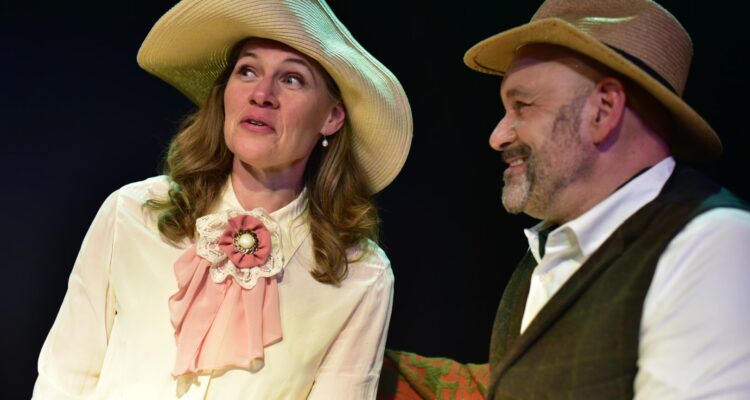This once scandalous play could only be performed in the UK in a private members’ club, it was thought to be so offensive. When it was played in the US in 1905 police went on stage and arrested the actors.
Now G.B.Shaw’s play about poverty and the choices before women (still a matter of controversy) gets an outing at the Brockley Jack whose small playing area suits the spaces where the action takes place: an English country garden, a vicarage drawing room, a London office.
Vivie Warren is just down from Cambridge, assertive and opinionated but ignorant in the ways of the world. She has been raised apart from her mother who is working abroad; she has not been told the identity of her father. The play opens to the first lengthy meeting between mother and daughter when she is an adult. Kitty Warren is sensitively played by Laura Fitzpatrick as a blowsy, forthright woman in fine clothes whose posh effect is slightly undermined by her working class accent.
Bethany Blake gives a strong performance as daughter Vivie though her character has the deficiencies of Shaw as a playwright: he is brilliant with the ideas, not so good on the psychology of how, for example, being brought up with a distant mother and no father might affect a girl’s behaviour. She just rolls on in a self-directed way with no apparent emotional needs and with props of cigars and whisky to show what an 1890s ‘New Woman’s she is.
The guts of the play, coming near the end of the first half, is when Kitty Warren explains to her daughter that her comfortable lifestyle and expensive education came from the profits of prostitution. Instead of presenting this as an ashamed confession, Kitty explains the choices she had before her: working in service or as a factory hand for starvation wages. She tells the story of her half-sister in the white lead factory, who had hoped she would get away ‘with her hands a little paralysed’ but industrial disease killed her; or Kitty herself working 14 hours a day in a bar in Waterloo for eight shillings a week. A play supposedly about sexual morality becomes one about poverty and the lack of opportunity of work for women.
Into the idyllic country cottage scene come three of Mrs Warren’s former lovers. One of them, Mrs Warren’s business partner the odious Sir George Crofts, is played as a ‘capitalist bully’ by Jonas Cemm who portrays exactly the right notes of entitlement and self-justification. He thinks he can marry Vivie but we know he may well be her father which makes his lascivious interest sickening.
Another is the Rev Samuel Gardner, a reluctant vicar played by Anthony Wise who hankers after his carefree past of debauchery. His son Frank is the real love interest for Vivie. He is tremendous fun, played with gusto by Joe Sargent, we certainly need his flippant commentary to leaven the weighty Shavian speeches.
The second half presents Vivie and therefore the audience with the reality of the brothels which Kitty Warren (and therefore Vivie) still benefits from.
The piece is played in 1930s rather than 1890s dress, I don’t think that choice brings anything new to the play while performing it in modern dress would increase its immediacy over an issue which is still of contemporary relevance.
The play delivers its punch, however: Vivie may be sanctimonious but those same skills of determination and business acumen, the same willingness to put themselves into the business that made Kitty an immoral woman make Vivie a moral one, no plying her trade as an accountant. The differences were the circumstances in which they were born, the choices they had before them.
This is a strong cast which kept the audience’s attention for two hours in a welcome outing for a little-performed play.
Playwright: Bernard Shaw
Director: Jonas Cemm
Cast: Bethany Blake, Laura Fitzpatrick, Joe Sargent, Jonas Cemm, Karl Moffatt, Anthony Wise.

